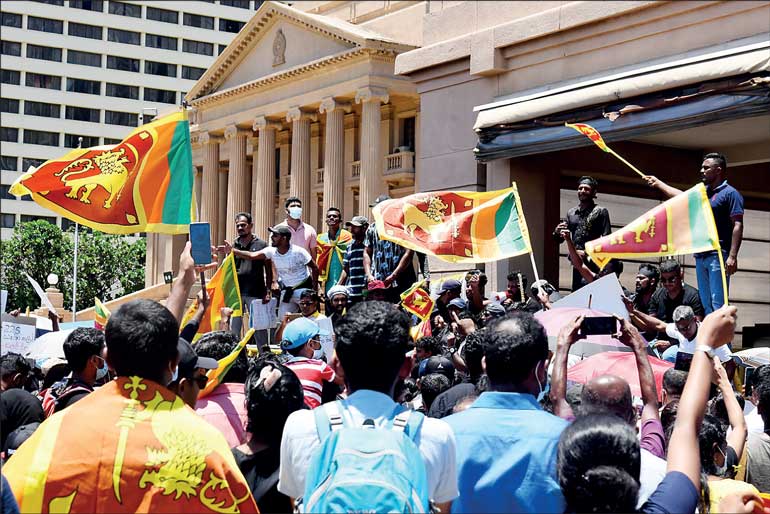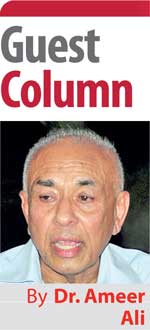Sunday Feb 15, 2026
Sunday Feb 15, 2026
Friday, 22 April 2022 00:21 - - {{hitsCtrl.values.hits}}

Unless the chief culprit Gotabaya’s powers are crippled and transferred to the Parliament, aragalaya would not end – Pic by Ruwan Walpola
“Politics has become too serious a matter to be left to politicians”
(T.S. Elliot)
 What history is witnessing today in Sri Lanka via an ‘aragalaya’ or struggle by a flood of unarmed citizens is a reminder of the truth behind that quote, which is also attributed sometimes to Charles de Gaulle. For over 70 years Sri Lankans showed interest in politics only during election times, and after choosing their representatives went to sleep until the next leaving politics in between to the care of politicians.
What history is witnessing today in Sri Lanka via an ‘aragalaya’ or struggle by a flood of unarmed citizens is a reminder of the truth behind that quote, which is also attributed sometimes to Charles de Gaulle. For over 70 years Sri Lankans showed interest in politics only during election times, and after choosing their representatives went to sleep until the next leaving politics in between to the care of politicians.
This may be the case even in matured democracies. But there are checks and balances placed within their democratic structure and national constitution, which keep politicians in check and make them carry out their duties with great responsibility. Such checks and balances in Sri Lankan democracy and constitution/s had been left to evaporate over decades, and under President Gotabaya Rajapaksa’s autocracy, or rather Gotacracy, they had virtually vanished.
It is the concentration of executive powers in the hands of a monomaniac president and reckless mismanagement of the economy by a cabinet of looters that had driven the country to financial bankruptcy. Aragalaya marks the beginning of a new journey by an awakened generation of ordinary as well as literate young men and women from every ethnic community and religion towards the restoration of a democratic regime in all its purity, checks and balances. It is a mission to end Gotacracy and remind politicians in general that politics is too serious a matter to be left to them alone. “Gota-Go-Gama” or GGG and “No 225 in Parliament” capture the essence of that mission.
President GR and Prime Minister MR are in a bind. They are digging in and refusing to grasp the seriousness of the mission. The resignation of cabinet ministers en masse, unwillingness of opposition parties to join GR for an all-party solution to the crisis and re-formation of a cabinet smaller in size with fresh faces but without three Rajapaksas are a tacit admission of guilt. Yet, unless the chief culprit Gotabaya’s powers are crippled and transferred to the Parliament, aragalaya would not end.
GR initially expected this struggle to fizzle out in a few days, but there is no sign of it, and instead is growing in size receiving support from leading personalities, civil society leaders and even members from religious hierarchies. The situation is now closely watched by UNHRC. Any attempt to crush the struggle with gendarmerie, even with consent from a slavish judiciary, would jeopardise negotiations with IMF and harden further the adverse international opinion. Therefore, if the regime determines to continue with cosmetic changes, there is only one solution and that would come from the “dark” side of Gotabaya.
Gendarmerie could be used with legitimacy if aragalaya turns violent, and violence could be manufactured. So far it had remained extraordinarily peaceful, apolitical and amazingly inclusive. That image could be broken and opportunity to use force with legitimacy created by engineering massive infiltration into it by pro-regime rabbles, as happened in Mirihana. For instance, it is not without reason that GR allowed BBS to operate freely, when PCoI recommended its proscription. He even promoted its secretary, an ex-prisoner, to head the taskforce to make recommendations to implement the so-called One Country One Law. Such apparatchiks could become handy to create a counter-aragalaya and break the peace.
One should not be surprised if such underhand tactics are used by the regime to create an excuse to activate the security forces.
This is a danger that protestors are facing. In the end, either aragalaya would end Gotacracy or Gotacracy would destroy aragalaya. What about the economy?
In the highly unlikely case of a triumph for Gotacracy, as predicted by one or two retired comprador academics, economic decline would prolong despite IMF’s rescue package, because no economy could thrive when people are unwilling to cooperate with an unpopular government. An economy is created and sustained by the people and for the people. It is their collective synergy that makes an economy grow. That synergy cannot be produced through a regime on which people have no confidence.
With a dysfunctional government IMF economists and specialists cannot create miracles.
This is why the former American President Eisenhower said that “the economy is too important to be left to economists”. Without solving the political crisis there is no solution to economic crisis.
It is to the credit of the Opposition that none of the political party has claimed ownership of the aragalaya, but has expressed their support to its cause.
The ball is now in the Opposition’s court and it is they who should find a solution to the impasse. Aragalaya must give them a chance to work out a solution within the parameters and conventions set by the Constitution and democracy respectively.
(The writer is attached to the Murdoch Business School, Murdoch University, Western Australia.)